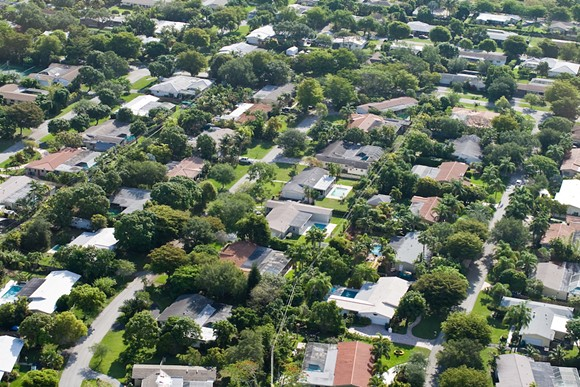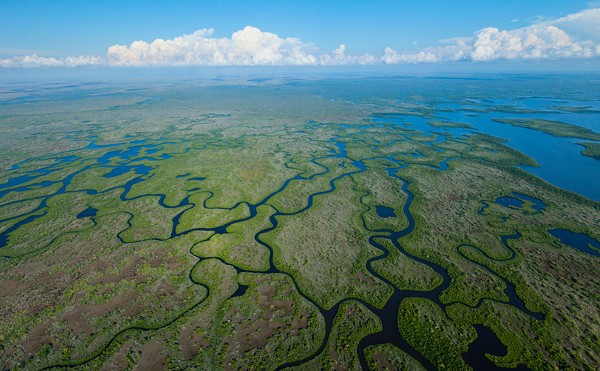Florida lawmakers want to spend $400 million in federal funds for rural broadband
Florida TaxWatch released a report that estimated a half-million Floridians don’t have access to high-quality internet.
By Jim Turner and News Service of Florida on Tue, Jan 25, 2022 at 11:43 am
Florida lawmakers are looking to use at least $400 million in federal stimulus money to help broadband providers expand services to mostly rural, underserved areas.
But don’t expect to see the money reduce rates for customers.
The Senate Commerce and Tourism Committee on Monday unanimously supported measures (SB 1800 and SB 1802) by Sen. Jim Boyd, R-Bradenton, that would fund a broadband program that lawmakers created last year within the Department of Economic Opportunity.
While voting for the proposal, Sen. Bobby Powell, D-West Palm Beach, and Sen. Jason Pizzo, D-North Miami Beach, noted that not everyone can afford broadband service where it is available.
“I can even pinpoint an area in my district, a block area where people are surrounded by broadband, but it's not accessible to them,” Powell said.
When asked by Sen. Victor Torres, D-Kissimmee, if customers could see savings from the program, Charter Communications lobbyist Albert Kaminsky said private providers are bearing the cost as they have to seek reimbursement from the state.
“Ultimately, again, (customers) would be taking advantage of this service, so we wouldn't be passing on additional costs to them by any means,” Kaminsky said. “They're (companies are) just offering a service.”
Sen. Joe Gruters, R-Sarasota, said the goal is to provide service as Florida ranks second in the number of residents without reliable internet access.
"I'll say that this bill was all about winners, because when you think about it, 10 percent of Floridians don't have any service," Gruters said. "I'd rather not have any discount, but I'd rather have internet access. Because that’s a great equalizer when it comes to employment. I mean, that's got to be the number one hindrance of growth in some of our rural areas. And I think (an existing) discount program that's offered by the providers is, when (customers) could prove that they need the assistance, is more than adequate."
The importance of internet access for work and education became even more clear as businesses and schools went remote during the COVID-19 pandemic.
The 2021 law required municipal electric utilities to offer to broadband providers through mid-2024 a discounted rate of $1 per attachment per year for any new pole attachment necessary to reach an unserved area or consumer. The law prohibits municipal utilities from raising current pole attachment rates for broadband providers before July 31.
A Senate staff analysis of Boyd’s bill said broadband access is available to 98 percent of the state’s urban areas and just 78.6 percent of rural areas.
The disparity is attributed to the cost of building broadband infrastructure “across larger swaths of rural geographic areas.”
“Often, broadband providers who seek to expand their infrastructure are met with denied or delayed utility pole access, or are asked to pay an excessive fee for the attachment, or even replacement of the entire pole,” the Senate report said.
Kaminsky said while the state’s funding proposal is “sizable,” North Carolina has half the number of residents without service and recently advanced a $1 billion broadband package. Still, he said the funding would “supercharge” the industry in Florida.
Before the meeting, Florida TaxWatch released a report that estimated a half-million Floridians, predominantly in rural areas, don’t have access to high-quality internet.
“Though Florida is currently fifth-best in a national ranking of broadband access, there’s clearly still significant room for improvement,” TaxWatch President and CEO Dominic M. Calabro said in a statewide.
The Tallahassee-based group estimated that just under half of the state’s 67 counties are more than 95 percent covered with broadband, ranging from 100 percent in Pinellas County to 1 percent in rural Dixie County. Five other rural counties — Gilchrist, Holmes, Jefferson, Levy, and Washington — are under 50 percent covered.
Under the proposal, pandemic stimulus money would be available to broadband providers at $5,000 or 50 percent of the cost —- whichever is less —- of the replacement cost for existing utility poles in unserved areas.
The money would be gathered in a new trust fund, with the idea of first using $400 million in federal money for the state to apply for another $100 million from the federal Coronavirus Capital Projects Fund.
The fund was part of a $10 billion allocation in the American Rescue Plan Act to carry out critical capital projects, with an emphasis on broadband infrastructure. Each state was eligible for at least $100 million, with additional money available based on the proportion of the population in rural areas and household incomes below 150 percent of the poverty line.
However, state lawmakers are unsure if the state will be able to get the additional money. as the deadline to apply was Dec. 27.
Rep. Josie Tomkow, R-Polk City, has filed a similar proposal (HB 1543 and HB 1545) in the House.
But don’t expect to see the money reduce rates for customers.
The Senate Commerce and Tourism Committee on Monday unanimously supported measures (SB 1800 and SB 1802) by Sen. Jim Boyd, R-Bradenton, that would fund a broadband program that lawmakers created last year within the Department of Economic Opportunity.
While voting for the proposal, Sen. Bobby Powell, D-West Palm Beach, and Sen. Jason Pizzo, D-North Miami Beach, noted that not everyone can afford broadband service where it is available.
“I can even pinpoint an area in my district, a block area where people are surrounded by broadband, but it's not accessible to them,” Powell said.
When asked by Sen. Victor Torres, D-Kissimmee, if customers could see savings from the program, Charter Communications lobbyist Albert Kaminsky said private providers are bearing the cost as they have to seek reimbursement from the state.
“Ultimately, again, (customers) would be taking advantage of this service, so we wouldn't be passing on additional costs to them by any means,” Kaminsky said. “They're (companies are) just offering a service.”
Sen. Joe Gruters, R-Sarasota, said the goal is to provide service as Florida ranks second in the number of residents without reliable internet access.
"I'll say that this bill was all about winners, because when you think about it, 10 percent of Floridians don't have any service," Gruters said. "I'd rather not have any discount, but I'd rather have internet access. Because that’s a great equalizer when it comes to employment. I mean, that's got to be the number one hindrance of growth in some of our rural areas. And I think (an existing) discount program that's offered by the providers is, when (customers) could prove that they need the assistance, is more than adequate."
The importance of internet access for work and education became even more clear as businesses and schools went remote during the COVID-19 pandemic.
The 2021 law required municipal electric utilities to offer to broadband providers through mid-2024 a discounted rate of $1 per attachment per year for any new pole attachment necessary to reach an unserved area or consumer. The law prohibits municipal utilities from raising current pole attachment rates for broadband providers before July 31.
A Senate staff analysis of Boyd’s bill said broadband access is available to 98 percent of the state’s urban areas and just 78.6 percent of rural areas.
The disparity is attributed to the cost of building broadband infrastructure “across larger swaths of rural geographic areas.”
“Often, broadband providers who seek to expand their infrastructure are met with denied or delayed utility pole access, or are asked to pay an excessive fee for the attachment, or even replacement of the entire pole,” the Senate report said.
Kaminsky said while the state’s funding proposal is “sizable,” North Carolina has half the number of residents without service and recently advanced a $1 billion broadband package. Still, he said the funding would “supercharge” the industry in Florida.
Before the meeting, Florida TaxWatch released a report that estimated a half-million Floridians, predominantly in rural areas, don’t have access to high-quality internet.
“Though Florida is currently fifth-best in a national ranking of broadband access, there’s clearly still significant room for improvement,” TaxWatch President and CEO Dominic M. Calabro said in a statewide.
The Tallahassee-based group estimated that just under half of the state’s 67 counties are more than 95 percent covered with broadband, ranging from 100 percent in Pinellas County to 1 percent in rural Dixie County. Five other rural counties — Gilchrist, Holmes, Jefferson, Levy, and Washington — are under 50 percent covered.
Under the proposal, pandemic stimulus money would be available to broadband providers at $5,000 or 50 percent of the cost —- whichever is less —- of the replacement cost for existing utility poles in unserved areas.
The money would be gathered in a new trust fund, with the idea of first using $400 million in federal money for the state to apply for another $100 million from the federal Coronavirus Capital Projects Fund.
The fund was part of a $10 billion allocation in the American Rescue Plan Act to carry out critical capital projects, with an emphasis on broadband infrastructure. Each state was eligible for at least $100 million, with additional money available based on the proportion of the population in rural areas and household incomes below 150 percent of the poverty line.
However, state lawmakers are unsure if the state will be able to get the additional money. as the deadline to apply was Dec. 27.
Rep. Josie Tomkow, R-Polk City, has filed a similar proposal (HB 1543 and HB 1545) in the House.

WE LOVE OUR READERS!
Since 1988, CL Tampa Bay has served as the free, independent voice of Tampa Bay, and we want to keep it that way.
Becoming a CL Tampa Bay Supporter for as little as $5 a month allows us to continue offering readers access to our coverage of local news, food, nightlife, events, and culture with no paywalls.
Scroll to read more Florida News articles
Newsletters
Join Creative Loafing Tampa Bay Newsletters
Subscribe now to get the latest news delivered right to your inbox.















